Welcome back to our continuing coverage of HBO’s television series, The Last of Us, starring Pedro Pascal and Bella Ramsey.
We’re four episodes deep now with three previous episodes under our belts, and the writers over at The Last of Us seem to be hitting a good stride. This episode brings us back to focus on our mains, Joel and Ellie, and the apocalyptic tundra they must navigate. Did you know people are the real monsters?
Let’s get into the recap and hope they can justify yet another episode with no zombies!
SPOILERS for the show through episode 4 and for the game through the content covered in episode 4
The Last of Us: Episode 3 “Please Hold My Hand” Summary
Alright first of all, these episode titles so far have been fine – but I wish they’d use game quotes as the titles. If an episode isn’t titled “That was Too Damn Close” by the end of the season I’m going to throw a tantrum.
Anyway, the show opens with our favorite little psychopath alone in a bathroom. Ellie is playing with her pilfered gun, practicing pointing, unloading, and shooting. I like these scenes with Ellie alone – they’re working really well so far to characterize her by showing us behaviors, as opposed to telling us what we should think. Ellie’s interest in violence is highlighted again in this scene, now giving us three distinct moments of this. Again, girls got a few screws loose.
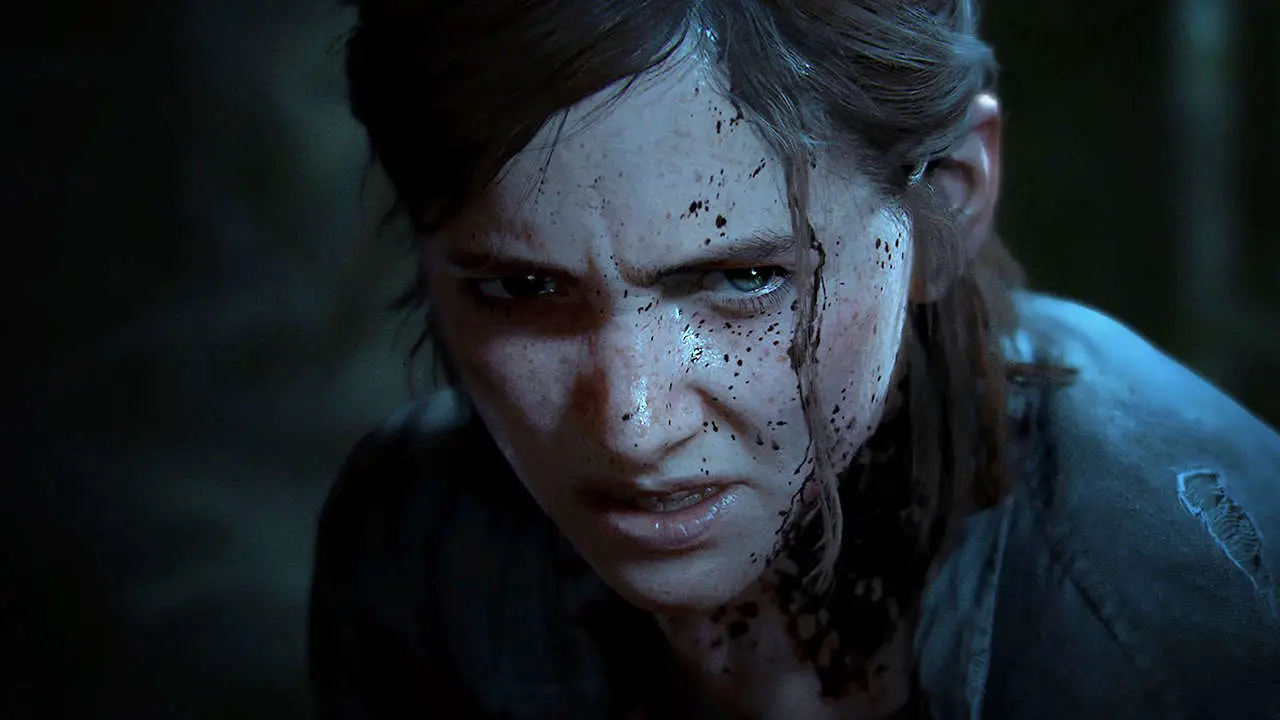
We’re then treated to a lovely scene with Ellie reading puns to Joel while he siphons gas from abandoned cars (and hand-waves away that the gasoline would be useless by now). It’s clear by episode four that The Last of Us writers’ strength is in clever, solid humor. Their writing shines in these interpersonal moments of fun candor, which is good, since so much of Joel and Ellie’s relationship is established this way. Unfortunately the writing is weaker in the dramatic moments – a problem in your zombie-apocalypse show.
Joel and Ellie drive on, and we get THE MAGAZINE SCENE.
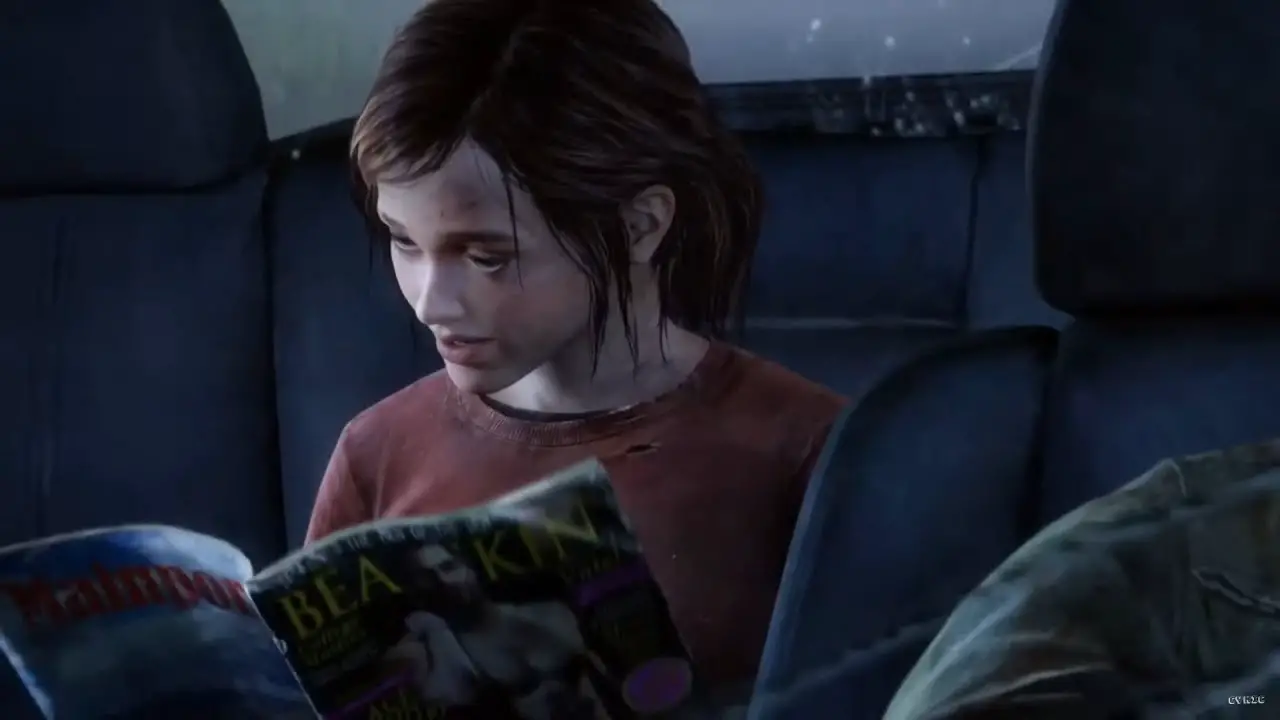
Gamers will recognize this sequence immediately. In the game, after Joel and Ellie drive away from Bill’s, Ellie discovers a male porn magazine in the back seat and the game makes clear that it’s his. The convo in the game is almost verbatim to the show – except that in the show Bill is not named as the owner of the magazine.
So this is a good example of how adaptational changes fixed an otherwise problematic scene. In the game, Bill’s queerness is *barely* on screen – it is implied when Bill says Frank was his “partner”, but otherwise Bill does not confirm this relationship. And since Frank is dead already in the game, we certainly never see the relationship. The magazine scene, therefore, is not representation: media is not representative if the inclusion is only a joke. The game included the porn mag scene for a cheap laugh at Bill’s expense without exploring his sexuality or relationship with Frank at all. Therefore, #problematic.
Nearly the identical scene exists in the show – so is it also problematic? Well no, actually it’s not. The show writers’ decision to explicate Bill and Frank’s relationship gave it respect, dignity, and legitimacy. Since Bill was a real character on screens that we bonded with (and sobbed over), a joke like this is no longer punching down at a marginalized group. Instead, it’s a funny joke about a person we know. Also, it’s clear the inclusion of Bill wasn’t solely to make this joke – whereas in the game, Bill being gay was unimpactful to the audience but for the funny magazine scene.
So for anyone out there looking for an example of how adaptation can improve a source material, here you go! It’s right here!
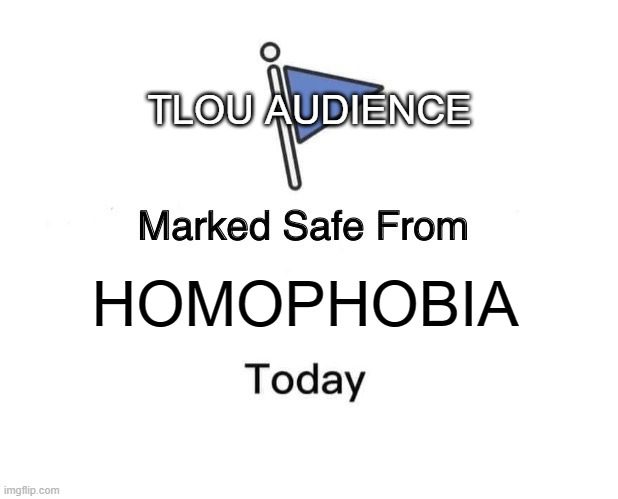
The next portion of the episode is a series of beautiful shots of the apocalyptic landscape. I am a sucker for landscapes, personally, and The Last of Us crew knows how to use a wide-open vista to soften my angry little heart. Joel and Ellie reach a roadblock on their way to Wyoming. In trying to go around it through the city, they are accosted by hunters and crash the truck. The two narrowly escape death, and Joel kills our first human casualties of the show.
Joel is surprised by one more Bad Dude™ who gets him pinned to the ground, choking him. Similar to a game scene, Ellie emerges from her hiding place and shoots the man in the back, wounding him gravely. Joel orders her back into her hiding place before he stabs the man in the heart (while he begs for his life and cries for his mother).
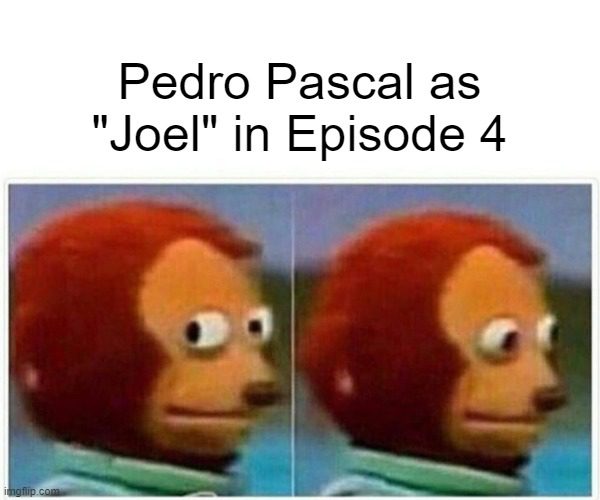
I think this scene is well-acted, and Bella Ramsey gets a good moment to shine. Ellie’s reaction to (basically) killing a man is to cry briefly, wipe her eyes, and get right back to doing the next thing. Joel’s reaction is also to move on right away. Both seem like very practical, non-emotional responses. However, given what we know of these characters by what we’ve seen on screen, their reasons for doing so are different. Joel feels guilty and responsible for Ellie having to shoot a man, but doesn’t know how to address his feelings; Ellie, on the other hand, either does not want to seem weak or thinks being upset at violence would actually make her weak. This is a fascinating character dichotomy we should track through the season.
The camera then brings us to two new characters. Kathleen (Melanie Lynskey), a white woman with strong Karen energy, is upset because some people named Sam and Henry escaped and had something to do with the death of her brother. It is also implied that Kathleen was part of the revolution to take down the QZ and expel FEDRA, the government. However, we see Kathleen commit murder, so we know she is a Bad Guy™. Is this the moral greyness we’ve all been searching for??
We’re also introduced to Perry (Jeffrey Pierce), whose most exciting trait so far is that he is played by the voice actor for game Tommy. (If they were gonna bring him on in the show anyway, why couldn’t he just play Tommy? Unclear.) Perry has a cool beard and lots of big boy guns. He takes Kathleen down into the basement of a building where the floor is pulsing and moaning.
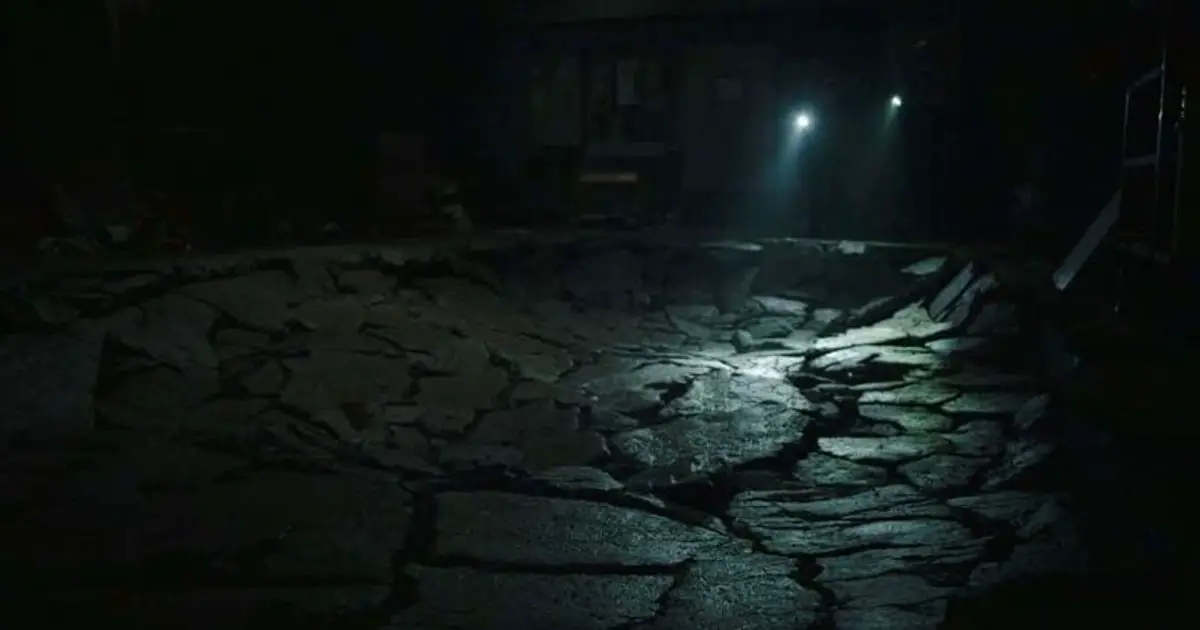
Kathleen says, “That’s not in this script, we’ll deal with that next episode in the last ten minutes or so” and they leave the moaning floor.
Meanwhile, Joel and Ellie are hiding out in a nearby shop. Joel, bless his heart, tries to apologize to Ellie for making her shoot a man. Pedro Pascal also shines here – Pascal and Ramsey together is proving to be a good combination in these interpersonal scenes. Unfortunately, the writing is a little stilted and generic, so the acting is carrying it. Ellie reveals she has already killed someone before. Hearing this, Joel gives her back the pilfered pistol and teaches her proper grip. He’s got the cutest dad vibes <3
Our two pistol pals then head up a tall building so they can get a look at the city landscape to find a route out (oof imagine not having Google maps!). They hide away in a room and fall asleep, but oh no! They wake up to two unknown people holding them at gunpoint!
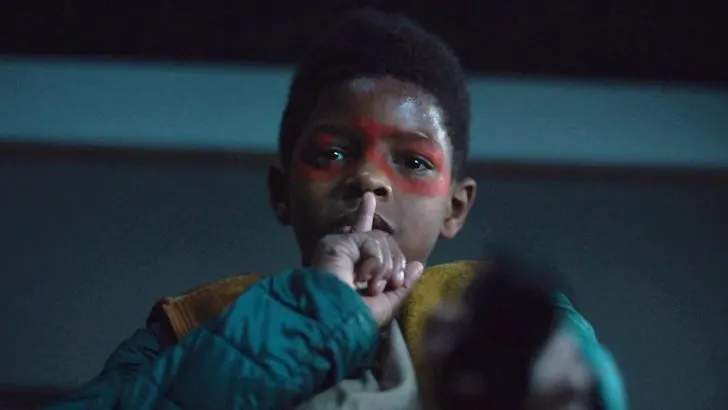
The screen cuts to black fifteen minutes early, and I said out loud “That’s it?”
Analysis: Creator Intention vs. Actual Product
Overall, this was a fine episode of The Last of Us. We’re back to our solid 7-ish area. I don’t know that I think it’s justified to not have any zombies yet again in my zombie-apocalypse show, but it looks like we’re gonna get a buncha cruncha them next week, so okay, we’ll wait.
An emerging problem I’m seeing in The Last of Us is a disconnect between what the creators want this story to be, versus what they actually show us. Creators always have a more intimate view of their own stories: hell, these characters come from the inner workings of their brains and are often very personal, precious thought-creatures that have existed in ethereal space for years if not decades. So it is all too common, then, for creators to intend to communicate something but actually fail to do so. It’s just because the creator is too close to the story and characters to be objective. This is why you have writing and creative teams of people, as a form of checks and balances.
The problem is that HBO lets its creators give little interviews after the episode, which almost always opens doors to criticism from an analytical standpoint, as opposed to providing any useful insight. HBO did this with Game of Thrones, House of the Dragon, and now The Last of Us. I think HBO should just stop doing this – the commentary is almost always either super basic (doesn’t the clicker make-up look neat??) or it makes no fucking sense.
My boy Neil Druckman is no exception (neither is Craig Mazin, who is the main offender in this episode). For episode three, Druckman said this story – meaning The Last of Us – is about different kinds of love, and that Bill and Frank’s story was the “purest” love story, or some such nonsense. I don’t know what narrative Druckman thinks he is writing, but The Last of Us is not a story about love. Indeed, even in the game, in terms of emotion it’s a story about loss, maybe some sacrifice (a little), but it’s mostly about the foolishness of having hope. We will continue this particular analysis when we have the whole season, so as to avoid spoilers here.
Anyway, very little of what we’ve seen in episodes 1, 2, or 4 have anything to do with love. Tess is maybe tangential to that; Sarah is probably the most on-point, but that’s about loss more so. If Druckman thinks The Last of Us is about love, I would ask for the citations and explanations, because that is not on our screens.
Now that’s not to say it couldn’t be on our screens for this zombie-apocalypse story. One of my main complaints as of this writing is that the Bill/Frank love story has no impact on the character arcs of Joel/Ellie or on the main narrative. As it stands, you could watch episodes 1, 2, and 4, and the only question you’d have after skipping 3 would be “Where’d they get the car?” That is indicative that episode 3 was filler.
An interesting narrative framework is to have a true, powerful love be karmically important by influencing a younger character to do heroic things (see, e.g., Harry Potter). Indeed, it’s one of the most powerful ways to thematically link characters. Just imagine how impactful it would have been for Ellie to meet a happy, committed, fun adult gay couple like Bill and Frank. That would have been transformative for her. That would have changed her character and propelled her to heroism, to fight for the life she now sees she could have. And they could’ve easily done that – but they didn’t. So when Druckman says this story is about love, but they fail to make love an impactful part of the narrative, well my friends, I am skeptical at best.
Craig Mazin is the perpetrator of evils in this episode, though. Mazin describes Ellie wiping away her tears after shooting that NPC because she’s “just like” Joel. Full stop, my dude. What? From what we have been shown on the screen, Joel and Ellie are not alike. In fact, in the episode 1 commentary, y’all said you were paralleling how Sarah and Ellie were so different – a parallel that I think has successfully continued. Joel is a man who suffered great loss and has struggled to survive in this world. He isn’t proud of his violence, and he only uses violence when he absolutely must. He even apologizes for having Ellie use violence. I know Tess said they were “bad people”, but receipts friends, receipts? I haven’t seen that with my eyeballs yet.
Ellie, meanwhile, has had three baby psychopath scenes in four episodes. These are scenes where she isn’t being watched or judged – she’s either alone or just reacting. And in all those scenes she displays a clear obsession with violence! Ellie also won’t take responsibility for anything. Remember, she told Joel not to blame her for Tess’s death, since Joel and Tess chose to escort her. Can you imagine Joel saying something like that?
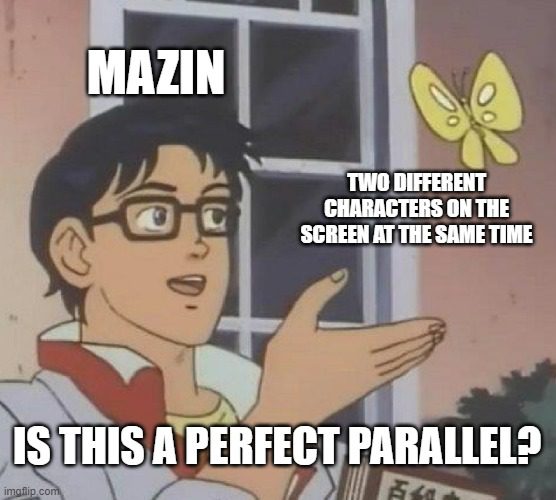
The fact of the matter is that these characters are not similar, and they’ve been specifically characterized on screen as being different. I don’t even think in the game they’re similar – but their similarities or differences are moot. The point is that Joel emotionally replaces his daughter with Ellie. The proper narrative comparison to make, therefore, is between Ellie and Sarah, and how that characterizes Joel’s blindness to his emotions.
But why do we even care what the creators say? I mean, death of the author, right? Personally, for an adaptation, I do think intent is important. There is a source material that is being changed – I want to know why, and I think it’s fair to ask. It’s also fair to criticize if it’s stupid. For example, I’m beginning to worry that episode 3 was, at its core, Druckman’s and Mazin’s attempt at mass virtue-signaling. If your gay characters are confined to one episode, to their own pocket-sized story, and have no impact on the overall narrative, then why did you bother? For representation? I’m not sure that’s good enough representation to justify itself. Including gay side characters may have been satisfactory ten years ago, but in modern media it feels lazy.
I also care what creators say because I just don’t like being lied to – and this is the main reason I think HBO maybe should stop these little interviews. If the creator asserts something is true about the story, but that thing is not on screen, that doesn’t fix the problem. Joel and Ellie aren’t anymore similar because Mazin said so. The Last of Us isn’t any more about love because Druckman said so. I don’t like being told what I’m supposed to think of an episode of media; I like being shown, through storytelling, as is the purpose of a TV show.
In sum, I did think this was a good episode of The Last of Us, with some good character moments and some clunky writing. The episode was definitely too short. On my totally arbitrary and subjective rating scale, I’d give it a 7 out of 10.
Images courtesy of HBO.
Have strong thoughts about this piece you need to share? Or maybe there’s something else on your mind you’re wanting to talk about with fellow Fandomentals? Head on over to our Community server to join in the conversation!

